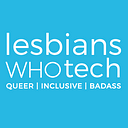Climate Justice is a Queer, Tech Issue

Climate justice is an intersectional equity issue disproportionately impacting queer people of color — and the tech industry can step in and help stop the fire of injustice from damaging our planet. Squad, LGBTQIA+ equity, racial justice and climate justice are interwoven pursuits towards social good, global health, and longevity of our people and our planet. As we continue celebrating Earth Day all year long, we must recognize how the tech sector, as large and influential as a NATO nation, can provide solutions to the varying crises of inequality facing our world. If we tackle the climate crisis, we can work towards eradicating all injustice.
It’s true that no one nation alone can eradicate the looming threat of climate change — but the global business and tech sectors can innovate the fight for climate justice through ethical measures and sustainable digital solutions.
Over the past five years, we’ve seen the tech and business sectors tackle major social justice issues by pushing new policies towards equity and parity. Now, it’s long-past time that fighting climate change be at the forefront of the movement towards global social justice.
Big Tech can act as a power source for good by taking direct climate action through policy changes, sustainability pledges, and innovative corporate communications. Tech’s far-reaching influence comes with the power and the platform to redirect messaging around climate justice and shape the narrative towards sustainability. But before Big Tech can take on the climate crisis, it’s critical that we collectively recognize how all crises of injustice are interconnected.
Varshini Prakash, Co-Founder of the Sunrise Movement, urges the world to “address the inherent inequalities in our system that lead to some people breathing worse-quality air, experiencing the brunt of storms and being able to recover far slower than other people”. According to Prakash, “those inequalities almost always fall along lines of race, class and gender.”
The socio-economic significance of environmental degradation is rooted in historical economic inequity disproportionately impacting communities of color. In the United States, Black and Brown communities are ground zero of the climate crisis. In 2015, we first learned that the drinking water in the city of Flint, Michigan was contaminated due to lack of regulations for sustainable infrastructure in which the government failed to put corrosion inhibitors on the pipes. Seven years later, the water in the city of Flint still isn’t clean. And it’s not because it’s impossible to fix the problem — it’s because aiding the predominately Black city of Flint, in which most citizens live below the national poverty line, is not a governmental priority. Now, the waterways and wildlife of Flint, in addition to the people, face severe health consequences.
It’s the lack of regulation to control pollutants caused by infrastructure that cause catastrophic events like the Flint water crisis and directly contribute to climate change. Climate injustice is directly linked to environmental racism and socio-economic inequity. The toxic water in Flint is just one example of how communities of color are overlooked in the face of environmental distress. Communities of color are more likely to live near toxic waste facilities impacting access to clean water and air, and less likely to receive disaster relief and response. Meaning, Black and Brown people are disproportionately impacted by the climate crisis. And, in spite of young activists standing on the forefront of the movement for climate justice — their work still isn’t making national headlines.
As all issues of social justice are intersectional, the climate crisis is no exception. In the United States, the LGBTQIA+ community faces greater risks as a result of climate change than heterosexual and cisgender Americans. And LGBTQIA+ people of color are at an even higher risk of experiencing environmental injustice. This is a direct result of the lack of social and economic infrastructure built to support and protect our community.
Homelessness, police brutality and segregation uniquely impact QTPOC folks, who experience marginalization and violence at the intercessions of racism, patriarchy, xenophobia, homophobia and transphobia. Lack of sustainable housing puts our community at greater risks of health issues as a result of air pollution and rising temperature. And this same injustice puts LGBTQIA+ immigrants and asylum-seekers in grave danger.
It’s clear that climate justice is an intersectional issue. But what can Big Tech and Big Business do to help? As stakeholders in the climate crisis, policy changes and financial investments are imperative to climate justice. Here are some tech companies making us feel optimistic towards the future of our planet ::
💙 In their 2019 Climate Pledge, Amazon announced steps to reach net-zero emissions by 2040.
💚 Microsoft has developed a plan to be carbon-negative by 2030.
💙 Meta released a statement committing to reaching net-zero emissions and restoring more water than they use by 2030.
💚 Google is committed to decarbonizing their energy consumption by 2030 and replenishing 120% of their consumable water.
💙 Apple has designated a fund towards climate investment as part of their $100 million Racial and Equity Justice Initiative fund, and is committed to a carbon-neutral supply chain by 2030.
But more can always be done. We urge our friends in Big Tech to continue working towards sustainability and talking about climate justice through an intersectional lens that prioritizes the experiences of people of color, LGBTQIA+ folks, and immigrants. The planet can be saved — and we need tech to help.
Read More About Intersectional Environmental Justice ::
🌎 Economic Impact of Colonialism
🌎 People of Color Are On the Front Lines of the Climate Crisis
🌎 Why The Fight for Climate Justice is a Fight for Justice Itself
